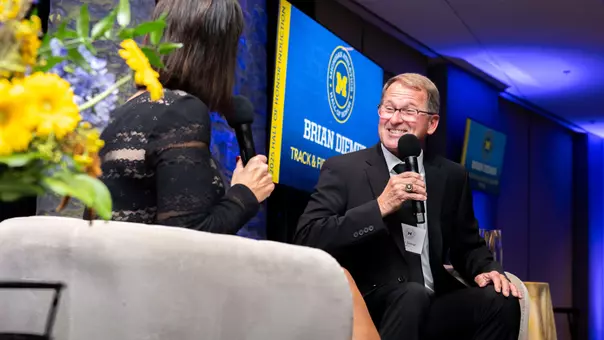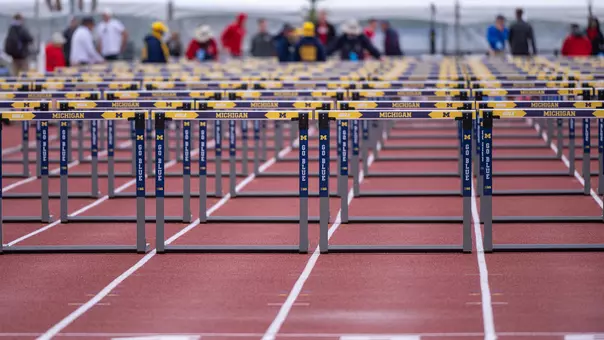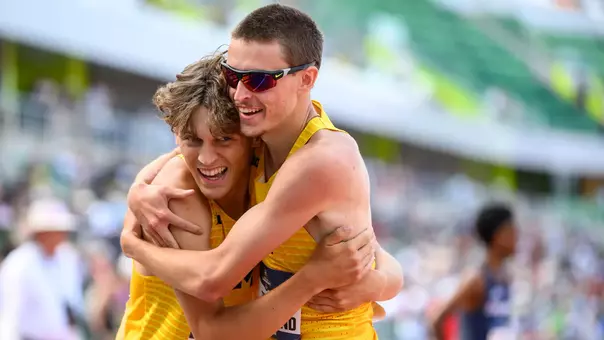Five Questions: Nate Brannen
7/8/2008 12:00:00 AM | Men's Track & Field, Features, Olympics
After months of slow and gradual recovery from back surgery last November, former Wolverine track standout Nate Brannen (2002-05) has returned to top form and is now in position to qualify for his first Olympic Games. Brannen claimed second place in the 1,500-meter run at the Canadian Olympic Trials last weekend (July 6) but missed the Olympic "A" standard (3:36.60) required. However, Athletics Canada granted him a two-week extension to hit the qualifying time.
Brannen experienced the highest of highs and the lowest of lows throughout a stellar collegiate career. A four-time NCAA champion, Brannen struggled with injury late in his U-M tenure, experiencing a severe ankle sprain during his 2004 Olympic preparation and, just a year later, suffering a foot sprain at the Big Ten Championships that ended his hopes of another NCAA title.
Last year he suffered from a herniated disc in his back, at level L5-S1, near the base of his spine. It was putting pressure on his nerves and sending constant and sharp pain down his right leg. Brannen ended up missing a full five months with the injury before finally having surgery. Now he's one good race away from realizing his lifelong goal of a trip to the Olympics.
Q: Did you expect your request for an extension to be granted?
Going into the Canadian Championships, I didn't think I had a chance to get an extension. I was told to get my time at the meet, and I just hoped the best would happen there. But realistically I didn't expect the time to come at that meet. Championship races aren't generally fast enough to hit good times. The meet record is 3:38 high, and that came in 1979. I took the first part of the race before another guy helped me out and took the last half, but unfortunately the pace slowed down a bit. But after the race I guess they felt my effort was good enough and my appeal was strong enough to grant me the two-week extension. So it was definitely a big surprise. It's like new life.

Q: When and where are you going to race to try to achieve the "A" standard?
I'm planning to race on Friday (July 11) in the Golden Gala in Rome. If I don't hit my time there, I'll head to Paris a week later for the Meeting Gaz de France Paris Saint-Denis, which is another IAAF Golden League event. I am very confident going overseas. If I can't get my time in one of those two meets, then it's just not coming. The only reason I can imagine for not getting it this weekend is travel fatigue or falling. I'm fit enough, I've run under the standard plenty of times, and the race is guaranteed to be fast. The guys who will be in this race will likely make up the Olympic final, so it will definitely be fast enough. I could be last and still be a second under the standard -- that's how fast it was last year.
Q: How difficult has your recovery from back surgery been?
I jumped back pretty quickly. I started running again on January 1, and that was just 30 seconds. By February I was up to running for a straight 10 minutes -- 10 on, 10 off times three. At the end of February, I started working out. I started at 66/67-second quarters and slowly got it back down to 55/56. In my first race out, I ran 3:38, which is the Olympic 'B' standard. I knew I was capable of it. Training was going well, but you never know with back surgery and taking a year off. But it went pretty well, and everything since then has gone great. I haven't had any setbacks with it. It was a long, slow process coming back from the surgery. Once we finally got everything settled down, we slowly picked at it with small things here and there.
Q: What is it with May ankle injuries for you?
In 2004 I got injured on May 14, and that took away any chance I had for the Olympics. The following year, it was May 14 again. This year it was May 21, so it was four years and a week later. I sprained my ankle earlier this year, doing a workout with Nick [Willis] down at the Arb. I stepped on a rock and sprained it. I missed four days -- I went to the pool those days -- but I raced a week later and ran pretty well. I still have a bit of pain there but nothing that is limiting. But when that happened, I just thought, "Here we go again, four more years to wait."
Q: What is your favorite Olympic moment?
I don't think I could pick just one moment. For me, just seeing all the images of athletes winning is memorable. The excitement of someone winning and realizing a lifelong dream. Even those moments leading into the Olympic Games, like Nicole [Forrester] jumping 1.95 meters last weekend to qualify -- that is what the Games are all about. You see that in other international events or even at the NCAAs, but nothing matches the same hype and emotion of the Olympics. There's nothing else like it.










